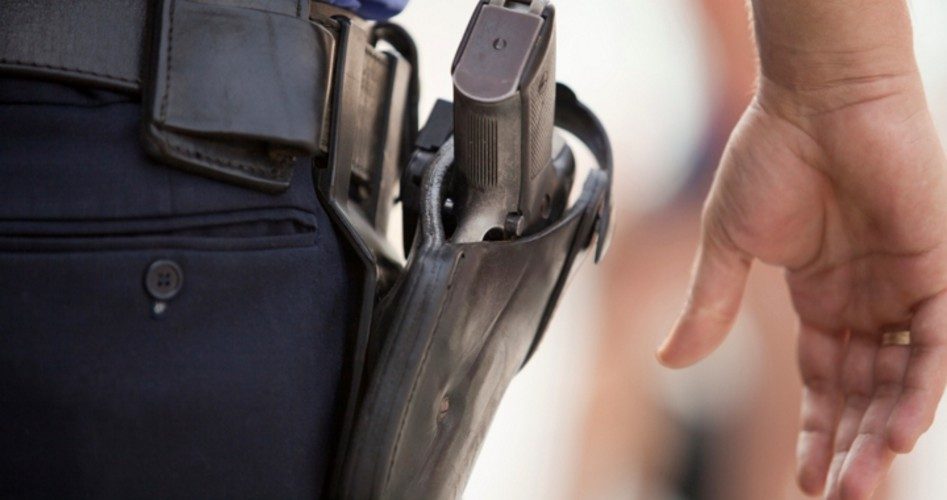
Within hours of the ruling by the Fourth District Court in Florida that the state’s prohibition of open carry is constitutional, at least two groups have come out against the ruling, with one of them announcing its intention to file an appeal.
At issue was the arrest in February 2012 of one Dale Norman as he was walking down the streets of Fort Pierce sporting a holstered handgun outside his tank top shirt. The initial investigation revealed that Norman held a newly issued concealed carry permit, but that didn’t stop police from arresting him and charging him with violating the state’s law against open carry. He appealed his conviction.
At issue, said the court, was “whether the Second Amendment forbids the State of Florida from prohibiting the open carry of firearms while permitting the concealed carry of weapons under [the state’s] licensing scheme.”
Norman, in his appeal, apparently challenged the state’s law by stating that, under the Second Amendment, he had a right to carry and didn’t need a permit to exercise that right. As the court expressed it:
Defendant asserts that he has a constitutionally-protected right to “keep and bear arms” [under the Second Amendment] that includes the ability to openly carry a gun outside the home for self-defense without the need for a permit.
The court quoted extensively from the two pivotal Supreme Court cases, Heller and McDonald, which clearly concluded that, yes, an individual has a right to “keep and bear arms” but that that right is subject to “traditional restrictions” which “show the scope of the right.” It added:
General regulations of activity within the scope of the Second Amendment are constitutional if they are 1) reasonable, and 2) do not effectively destroy the right in practice by imposing a substantial limitation on its exercise.
Florida’s light touch on those potential limitations has earned the state the moniker “the Gunshine State.” For instance, Florida requires no license to purchase long guns or handguns, there is no state registration required when purchasing them, and the state has no “assault weapon” ban or any restrictions on magazine capacities. It has no restrictions on “peaceable journey” while carrying, and a citizen is not required to inform an officer that he is carrying during a routine stop. Further, citizens are free to buy and sell firearms privately without a federal background check.
It has one of the least restrictive concealed carry laws in the nation, issued on a “shall-issue” basis dating all the way back to 1987.
However, when it comes to open carry, it’s a different ball game: Open carry of firearms in Florida is generally banned altogether, with few exceptions. Officially, this makes Florida a “non-permissive open carry” state, where open carry is prohibited even if the offender has a concealed carry permit.
Even there the law is written to allow the maximum freedom of a permit holder:
It is not a violation of this section for a person licensed to carry a concealed firearm … to briefly and openly display the firearm to the ordinary sight of another person, unless the firearm is intentionally displayed in an angry or threatening manner, not in necessary self-defense.
This didn’t help Norman, however, because of a video introduced at his trial showing him wearing a tank top and his holstered firearm riding clearly outside his shirt on his hip.
The issue hinged not on the language of the Second Amendment but on Florida’s equivalent, which had distinctly different and highly relevant language that wound up confirming Norman’s conviction:
The right of the people to keep and bear arms in defense of themselves and of the lawful authority of the state shall not be infringed, except that the manner of bearing arms may be regulated by law. [Emphasis added.]
This was sufficient for the court to confirm the lower’s court’s ruling against Norman:
Thus, we conclude that Florida’s ban on open carry, while permitting concealed carry, does not improperly infringe on Florida’s constitutional guarantee, nor does it infringe on “the central component” of the Second Amendment: the right of self-defense….
Florida’s licensing scheme is not unduly restrictive and is consistent with the valid use of its police powers and the dictates of the Constitution….
Through its “shall-issue” permitting scheme, Florida has provided a viable alternative outlet to open firearms carry which gives practical effect to its citizens’ exercise of their Second Amendment rights.
This wasn’t acceptable to either the JPFO (Jews for the Preservation of Firearms Ownership) or Florida Carry. According to the JPFO, “The right to bear arms has now been completely infringed in Florida” and because of “numerous legal and technical defects with the court’s order, in coming days [Florida Carry] will ask the court to rehear the case and correct its ill-considered decision.”
However, on the other side of the spectrum, Eugene Volokh, writing in the Washington Post the day of the decision, found the decision completely acceptable:
I think the court was quite right to recognize a right to carry guns in public for self-defense. I also think the court was right to allow the state to limit such carrying to concealed carrying, precisely because such [concealed] carrying doesn’t substantially interfere with the ability to defend oneself.
Any appeal is likely to meet the same fate.
A graduate of an Ivy League school and a former investment advisor, Bob is a regular contributor to The New American magazine and blogs frequently at www.LightFromTheRight.com, primarily on economics and politics.



